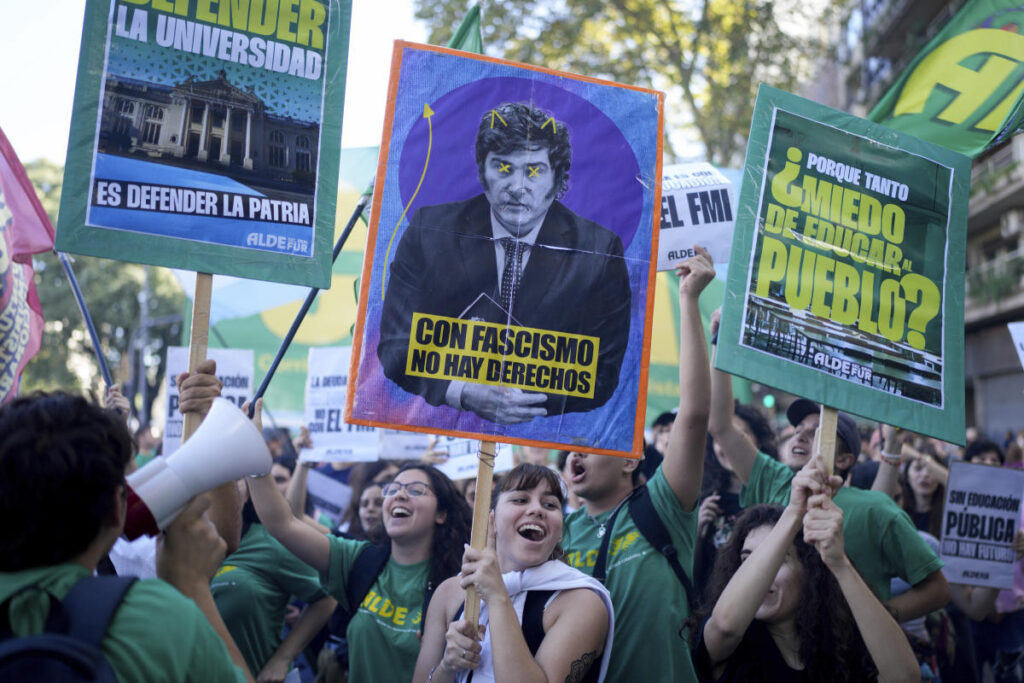BUENOS AIRES, Argentina (AP) – Hundreds of thousands of Argentines held up textbooks and diplomas and sang the national anthem in an outpouring of anger that filled the streets of Buenos Aires and other cities on Tuesday and opened doors to the country's public universities. requested an increase in funding.a libertarian president Javier Millaysevere austerity measures.
The scale of the demonstration in downtown Buenos Aires appeared to exceed other large demonstrations that have rocked the capital since Mr. Millay took power.
Students and professors joined forces with the country's powerful trade unions and leftist parties to protest budget cuts that have forced Argentina's most venerable university to declare a state of financial emergency and warn of impending closure. .
Conservative politicians, private university administrators and even right-wing TV personalities joined the march amid growing unrest in response to Millais' policies, an Argentina that has supported the country's social progress for decades. championed the common cause of public education.
“This is historic,” said protester Ariana Tierre Lara, a 25-year-old recent graduate. “I feel like everyone has come together.”
Millais describes universities as bastions of socialism instilled by professors in their students, and as usual tries to dismiss the university's budget crisis as a result of politics.
“The cognitive dissonance that brainwashing causes in public education is enormous,” he says.
Last week at the University of Buenos Aires (UBA), hallways went dark, elevators froze and air conditioning stopped working in some buildings. Because the public university could not cover the electricity bill, professors held lectures for about 200 people without using microphones or projectors.
“This is an unthinkable crisis,” said Valeria Agnon, 50, a literature professor at the university, known as UBA. “It's sad for my students and for myself as a professor and researcher.”
Millay has slashed spending across Argentina in an effort to eliminate the budget deficit, closing ministries, cutting funding to cultural centers, laying off state employees and cutting subsidies. On Monday, he announced that Argentina had achieved a quarterly budget surplus for the first time since 2008, and assured the nation that the pain would be worth it.
“We are making the impossible possible, despite the opposition of the vast majority of political, trade union, media and economic actors,” he said in a televised address.
The footsteps of demonstrators could be heard in the city center on Tuesday. “Why are you so scared of public education?” Banner asked. “We will protect the university ourselves!” the students shouted.
“We are trying to show the government that it cannot take away our right to education,” said Santiago Ciraolo, 32, a social communication student who was protesting on Tuesday. “Everything is at risk here.”
Since the fiscal year began last July, the state has provided the University of Buenos Aires with just 8.9% of its total budget, with annual inflation currently hovering around 290%. The university says this is barely enough to keep the lights on and provide basic services at its teaching hospital, which is already at reduced capacity.
The university warned last week that without a rescue plan, schools would close in the coming months, leaving 380,000 students halfway through their degrees stranded. It's a shock to Argentines who consider free, high-quality university education a birthright. UBA has a proud intellectual tradition, having produced five Nobel laureates and his 17 presidents.
Alex Vargas, 24, an economics student, said, “This university has given me a future and opportunities that my family and many other people at my income level would never have had.'' Told. “When you step back, you realize how important this is to our society.”
President Milai took power last December, inheriting an economy in tatters due to years of chronic overspending and choking international debt. During his campaign, he brandished a chainsaw as a symbol of budget cuts and repeated his simple catchphrase to his compatriots upset over budget cuts and the 50% devaluation of the peso: “There's no money.”
Overall, Argentina devotes 4.6% of its gross domestic product to education. Public universities are also free for international students and attract many students from all over Latin America, Spain, and further afield. Critics of the system are calling for international students to pay dues.
“Where I come from, unfortunately, quality education is a privilege, not a fundamental right,” said Sofia Hernandez, a 21-year-old from Bogotá, Colombia, studying medicine at UBA. I wish more countries did this. ”
The government announced late Monday that it would send about $24.5 million to cover the upkeep of public universities and another $12 million to keep medical centers open.
Presidential Spokesperson Manuel Adorni said: “The discussion has been settled.”
University officials disagreed, saying they had not yet received the promised transfer fee, but it only covered part of what was needed. For UBA, this means a 61% reduction in its annual budget.
UBA Treasurer Mathias Ruiz said teachers also needed to be careful. In the past four months their income has decreased by more than 35%. Staff salaries can be as low as $150 per month. Professors juggle multiple tasks.
Ines Aldao, 44, a literature professor at UBA, said: “Under previous right-wing governments there were funding and salary freezes, but this cut is three times worse.''
Just hours after Milais declared economic victory from the presidential palace, angry students, teachers and workers snaked through the capital's streets.
“We are building a new era of prosperity for Argentina,” Millay told the nation, boasting that Argentina had a quarterly budget surplus of 0.2 percent of gross domestic product. .
A huge banner hung in downtown Buenos Aires offering a choice between Millais and public education.
___
Follow AP coverage of Latin America and the Caribbean at https://apnews.com/hub/latin-america.


